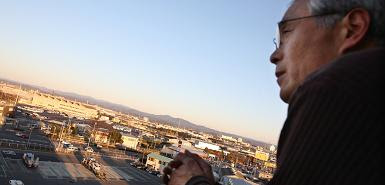 Tadao Wakatsuki in Toyota City, Japan. He sent a memo to Toyota's president in 2006 condemning "safety sacrifices"
Tadao Wakatsuki in Toyota City, Japan. He sent a memo to Toyota's president in 2006 condemning "safety sacrifices""The Toyota Ways is famous. In reality it is to ignore warnings from within the firm"
- Toyota was forced yesterday to hand over to US congressional investigators a "smoking gun" memo produced by its own factory workers that warned management as far back as 2006 of systemic threats to car safety.
- The two-page memo, drafted by a group of long-term Toyota employees and sent directly to Toyota’s thenpresident Katsuaki Watanabe in 2006, condemns "safety sacrifices" made by the company in pursuit of profit.
- It highlights the inadequate development times for new vehicles and the general decline of craftsmanship at Japan’s most famous manufacturing company, concluding that vital processes were in the hands of "amateurs".
- The document also offered a chilling foretaste of the calamity that was to come, warning that Toyota’s management policies would ultimately threaten the company’s survival.
- Tadao Wakatsuki, the principal author of the memo, was interviewed by The Times two years ago, when he warned that Toyota’s expansionism was creating new victims: its employees were buckling under the burdens of cost-cutting and the customer was about to pay an unhappy price.
- Mr Wakatsuki has worked on the floor of one of Toyota’s largest Japanese factories for 45 years. Along with several other employees both of Toyota and its subsidiaries, he set up a breakaway union in an attempt to improve working conditions throughout the group. His decision to form the All Toyota Labour Union, he said, was based on what he saw as the acquiescence of the official union – a body that rarely challenged management.
- The Toyota Way is famous all over the world. In reality, the Toyota Way is to ignore warnings from within the firm, he said.
- People work themselves to sickness because they are scared to do differently. Do you think that situation is good for the cars or the way they are built?
- We used to do safety and quality checks on every single vehicle that leaves the plant. Not any more. Not even two thirds get the full treatment.
- Mr Wakatsuki, who works in the in the machine press stamping section of the factory, said that cost-cutting and speed had become the dominant ethos at the expense of experience and thoroughness. "Top to toe" safety checks were no longer conducted on 100 per cent of cars, he alleged.
- Even before reports had begun to surface about faulty accelerator pedals, Mr Wakatsuki believed that problems would eventually emerge to haunt Toyota. The company, he said, had allowed itself to grow too fast and in the process forgotten what it was that made its brand so strong. Those exact words were echoed last month by Akio Toyoda, the current Toyota president, when he apologised for mass recalls and attempted to explain how a company of Toyota’s calibre had got into such a mess.
- The memo, by Mr Wakatsuki and five fellow members of the union, was written when Toyota was emerging from a criminal investigation into professional negligence over a car accident where five family members were injured. Toyota was cleared of all charges but Mr Wakatsuki and his collaborators demanded management provide a fuller explanation of what had happened.
- As well as dwelling on numerous alleged shortcomings of Toyota’s management practices, the memo made seven requests. One of them demanded a review of cost reduction measures "so that the company can guarantee the manufacturing of safe cars".
- Toyota acknowledged yesterday that senior management had seen the original memo, but deemed it appropriate to respond to only one of its requests – a polite suggestion that management look into ways of reducing the total number of hours worked by employees each year.
- The carmaker remains in crisis after a global recall of nearly nine million vehicles, a growing barrage of litigation and allegations that accelerator faults caused the death of dozens of people on American roads.
No comments:
Post a Comment